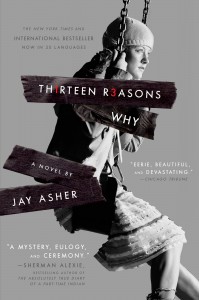 The school district in Anderson County, Kentucky has pulled Jay Asher’s novel Thirteen Reasons Why from middle school classrooms, despite the fact that it had been approved for instructional use last school year. According to the local newspaper, Superintendent Sheila Mitchell admitted in an email that “the advertisement of the [Netflix] series played a factor in the decision to no longer use the book.”
The school district in Anderson County, Kentucky has pulled Jay Asher’s novel Thirteen Reasons Why from middle school classrooms, despite the fact that it had been approved for instructional use last school year. According to the local newspaper, Superintendent Sheila Mitchell admitted in an email that “the advertisement of the [Netflix] series played a factor in the decision to no longer use the book.”
Although Asher’s book was first published ten years ago, it has recently encountered a sudden surge in challenges, bans, and restrictions in schools around the country due to panicked adult backlash against the Netflix series based on it, which met with instant success among teens after its March 31 release. The series in particular has been criticized by some for allegedly glamorizing teen suicide as it depicts the events leading up to the death of Hannah Baker, a high school student who kills herself after recording 13 cassette taped messages for people she feels contributed to her misery.
With approval from Anderson County Middle School principal Jenna Rose, excerpts from the book were used in a single enrichment class during the Spring 2016 semester. Subsequently, according to Mitchell, “the manner in which the book was beginning to be used…was not the original intent, so the principal informed the teacher to find other resources to support the concept.”
The policy and/or procedure for prior approval of instructional materials does not appear to be outlined in Anderson County Schools’ policy manual. There is a policy (08.2322) and procedure (08.2322 AP.1) for review of instructional materials challenged “on the basis of citizen concerns,” which requires the formation of a review committee. As in other cases concerning the restriction of this particular book across the country, however, it seems that the district did not actually receive a challenge from a parent or other member of the public before deciding to remove it from the classroom.
Despite the fact that the restriction happened in the public school district, the Anderson News devoted a sizable chunk of its story to the views of Brian Owens, a Bible teacher from the Christian Academy of Lawrenceburg. While Owens said that parents who allow their children to read or watch either version of Thirteen Reasons Why should “be prepared to interject gospel-centered hope into the equation,” even he admitted the few episodes of the Netflix series that he watched were “much darker, profane and much more explicit than the book.”
By all appearances, this is yet another example of Asher’s original novel being conflated with the Netflix series based on no evidence that either actually has a detrimental effect on students in general. In fact, the author himself frequently hears from young readers who tell him that the book literally saved their lives because they recognized Hannah’s suicidal tendencies in themselves and sought help before it was too late. At the very least, Anderson County Schools should take steps to clarify the approval process for instructional materials, and explain why the novel became inappropriate for classroom use only after the release of the streaming series.
Help support CBLDF’s important First Amendment work in 2017 by visiting the Rewards Zone, making a donation, or becoming a member of CBLDF!
Contributing Editor Maren Williams is a reference librarian who enjoys free speech and rescue dogs.